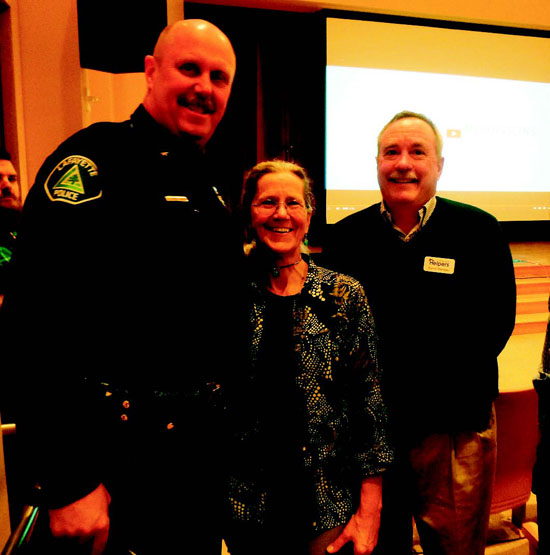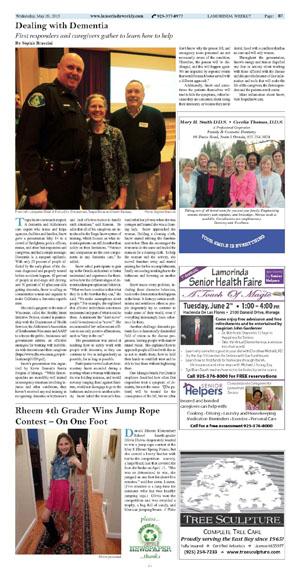|
|
Published May 20th, 2015
|
Dealing with Dementia
|
| First responders and caregivers gather to learn how to help |
| By Sophie Braccini |
 |
| From left: Lafayette Chief of Police Eric Christensen, Teepa Snow and Kevin Reneau Photo Sophie Braccini |
Teepa Snow commands respect. A dementia and Alzheimer's care expert who trains and helps agencies, facilities and families, Snow gave a presentation May 14 to a crowd of firefighters, police officers, nurses, and other first responders and caregivers, and had a simple message: Dementia is a rampant epidemic. With only 20 percent of people affected by the early phase of the disease diagnosed and properly treated before accidents happen, 40 percent of people at mid-stage still driving, and 50 percent of 85-plus-year-olds getting dementia, Snow is calling on communities to train and organize to make California a dementia-capable state.
 She cited a program in the state of Wisconsin, called the Healthy Brain Initiative Project, created in partnership with the Department of Health Services, the Alzheimer's Association of Southeastern Wisconsin and AARP to educate the public, businesses and government entities on effective strategies for working with individuals with dementia and their caregivers (https://www.dhs.wisconsin.gov/publications/p01000.pdf).
She cited a program in the state of Wisconsin, called the Healthy Brain Initiative Project, created in partnership with the Department of Health Services, the Alzheimer's Association of Southeastern Wisconsin and AARP to educate the public, businesses and government entities on effective strategies for working with individuals with dementia and their caregivers (https://www.dhs.wisconsin.gov/publications/p01000.pdf).
 Snow's presentation was organized by Kevin Reneau's Senior Helpers of Moraga. "While first responders are incredibly well trained in emergency situations involving injuries and other conditions, they haven't received any real training in recognizing dementia or Alzheimer's and lack effective tactics to handle such situations," said Reneau. He adds that all of his caregivers are introduced to the Teepa Snow system of training, which focuses on what dementia patients can still do rather than solely on their limitations. "Patience and compassion are the core components in any dementia care," he added.
Snow's presentation was organized by Kevin Reneau's Senior Helpers of Moraga. "While first responders are incredibly well trained in emergency situations involving injuries and other conditions, they haven't received any real training in recognizing dementia or Alzheimer's and lack effective tactics to handle such situations," said Reneau. He adds that all of his caregivers are introduced to the Teepa Snow system of training, which focuses on what dementia patients can still do rather than solely on their limitations. "Patience and compassion are the core components in any dementia care," he added.
 Snow asked participants to pair up in the Orinda auditorium to better understand and experience for themselves how the different stages of dementia alters perception and behavior. "What we have to realize is that what they do is the best that they can," she said. "We make assumptions about people." For example, she explained that affected individuals sometimes understand only part of what is said to them. A statement like "don't move" could be understood as "move!" She recommended law enforcement officers to use only positive affirmations, such as "stay in the car."
Snow asked participants to pair up in the Orinda auditorium to better understand and experience for themselves how the different stages of dementia alters perception and behavior. "What we have to realize is that what they do is the best that they can," she said. "We make assumptions about people." For example, she explained that affected individuals sometimes understand only part of what is said to them. A statement like "don't move" could be understood as "move!" She recommended law enforcement officers to use only positive affirmations, such as "stay in the car."
 The presentation was aimed at teaching how to safely work with people with dementia, so they can continue to live as independently as possible, for as long as possible.
The presentation was aimed at teaching how to safely work with people with dementia, so they can continue to live as independently as possible, for as long as possible.
 Participants viewed a short documentary Snow recorded during a meeting where a woman with dementia was holding maracas, and would not stop banging them against furniture, would not disengage to go to the bathroom and move to another activity. Snow asked the woman's husband what her job was when she was younger and learned she was a cleaning lady. Snow approached the woman. Holding a cleaning cloth, Snow started rubbing the furniture next to her. Then she encouraged the woman to do the same and traded the maracas for a cleaning cloth. To help the woman end the activity, she moved furniture away and started praising her for her accomplishments, finally succeeding in taking her to the bathroom and focusing on another task.
Participants viewed a short documentary Snow recorded during a meeting where a woman with dementia was holding maracas, and would not stop banging them against furniture, would not disengage to go to the bathroom and move to another activity. Snow asked the woman's husband what her job was when she was younger and learned she was a cleaning lady. Snow approached the woman. Holding a cleaning cloth, Snow started rubbing the furniture next to her. Then she encouraged the woman to do the same and traded the maracas for a cleaning cloth. To help the woman end the activity, she moved furniture away and started praising her for her accomplishments, finally succeeding in taking her to the bathroom and focusing on another task.
 Snow traces every problem, including these obsessive behaviors, back to the deterioration that happens in the brain. It destroys certain mechanisms and reinforces others as people desperately try to continue to make sense of their world, even if everything increasingly loses coherence for them.
Snow traces every problem, including these obsessive behaviors, back to the deterioration that happens in the brain. It destroys certain mechanisms and reinforces others as people desperately try to continue to make sense of their world, even if everything increasingly loses coherence for them.
 Another challenge dementia patients face is dramatically diminished field of vision as the disease progresses, leaving people with narrow tunnel vision. She explained how to approach people afflicted with this so as not to startle them, how to hold their hands to establish trust and be able to lead them without frightening them.
Another challenge dementia patients face is dramatically diminished field of vision as the disease progresses, leaving people with narrow tunnel vision. She explained how to approach people afflicted with this so as not to startle them, how to hold their hands to establish trust and be able to lead them without frightening them.
 One Moraga-Orinda Fire District employee described how often first responders treat a symptom of dementia, but not the cause. "[The patient] will be treated for the consequence of the fall, but we often don't know why the person fell, and emergency room personnel are not necessarily aware of the condition. Therefore, the person will be discharged, and this will happen again. We are impacted by repeated events that would be much better served with a different approach."
One Moraga-Orinda Fire District employee described how often first responders treat a symptom of dementia, but not the cause. "[The patient] will be treated for the consequence of the fall, but we often don't know why the person fell, and emergency room personnel are not necessarily aware of the condition. Therefore, the person will be discharged, and this will happen again. We are impacted by repeated events that would be much better served with a different approach."
 Additionally, Snow said sometimes the patients themselves will tend to hide the symptoms, either because they are concerned about losing their autonomy, or because they are in denial, faced with a condition that has no cure and will only worsen.
Additionally, Snow said sometimes the patients themselves will tend to hide the symptoms, either because they are concerned about losing their autonomy, or because they are in denial, faced with a condition that has no cure and will only worsen.
 Throughout the presentation, Snow's energy and humor dispelled any fear or anxiety about working with those afflicted with the disease and she provided matter-of-fact information and tools that will make the life of the caregivers, the first responders and the patients much easier.
Throughout the presentation, Snow's energy and humor dispelled any fear or anxiety about working with those afflicted with the disease and she provided matter-of-fact information and tools that will make the life of the caregivers, the first responders and the patients much easier.
 More information about Snow, visit www.TeepaSnow.com.
More information about Snow, visit www.TeepaSnow.com.


|
|
|
|
|
|
|
|
|
| |
|
|
|
|



